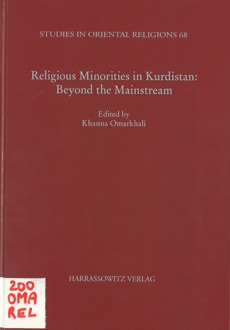Contents
List of Illustrations / VII
List of Tables / VIII
Abbreviations / IX
Preface and Acknowledgements / XIII
Transcription / XV
Introduction - Religious Minorities in Kurdistan: Beyond the Mainstream / XVH
Khanna Omarkhali
Ahl-e Haqq (Yaresan I Kaka î)
The Yaresan of Kurdistan / 3
Philip G. Kreyenbroek (Göttingen)
Hajj Ne'matollah Jayhunabadî (1871-1920) and His Mystical Path within the
Ahl-e Haqq Order / 13
Mojan Membrado (Paris)
Life as Ritual: Devotional Practices of the Kurdish Ahl-e Haqq of Guran / 47
Partow Hooshmandrad (Fresno, California)
Yezidis
Current Changes in the Yezidi System of Transmission of Religious
Knowledge and the Status of Spiritual Authority / 67
Khanna Omarkhali (Göttingen)
One Community, Two Identities: Syria’s Yezidis and the Struggle of a
Minority Group to Fit in / 79
Sebastian Maisel (Allendale, Michigan)
Yezidis in Censuses in the USSR and Post-Soviet Countries / 97
Nodar Mossaki (Moscow)
Alevis
“Our Alevi and Kurdish Brothers” - Some Remarks on Nationalism and
Minority Politics in Turkey / 139
Markus Dressler (Bayreuth)
An Inside View of the Kurdish Alevis: Dîwana Heq of Pir Ali Bali / 159
Lokman Turgut (Erfurt)
The Politics of Religious and Ethnic Identity among Kurdish Alevis in the
Homeland and in Diaspora / 173
Janroj Keles (London)
Sufi Orders and Shabak
The Haqqa Community: A Heterodox Movement with Sufi Origins / 227
Thomas Schmidinger (Vienna)
Khaksar Order in Kurdistan / 235
Shahrokh Raei (Gottingen)
The End of Heterodoxy? The Shabak in Post-Saddam Iraq / 247
Michiel Leezenberg (Amsterdam)
Jews
The Kurdish Jewish Communities - Lost Forever / 271
Birgit Ammann (Potsdam)
Kurdish and Neo-Aramaic Literature of Kurdistani Jews / 301
Yona Sabar (Los Angeles)
Christians
Coping in Kurdistan: The Christian Diaspora / 321
Erica C.D. Hunter (London)
“The Thieving Kurds”: A Stereotype among Syrian Christians Concerning their
Coexistence with the Kurds / 339
Martin Tamcke (Gottingen)
Text, Religion, Society. The Modem Kurdish Bible Translations in the
Context of the Socio-political Changes in Kurdistan / 353
Marcin Rzepka (Krakow)
Illustrations / 371
Contributors / 385
Glossary of Terms / 391
Index
I. Personal Names / 397
II. Place Names / 401
III. General Index / 406
List of Illustrations1
Illustration 1 Three well-known kalam-khwans of the Guran region during the
Khawandkar annual celebrations in the village of Tûtshamî / 373
Illustration 2 Transcription of the group nazm Razhiyan Ddldhû / 374
Illustration 3 Yezidis during the religious feast Eyda Ezid, Armenia, 1963 / 375
Illustration 4 The village of Shadala, May 2008 / 376
Illustration 5 The cemetery of Shadala, April 2006 / 376
Illustration 6 Xaniim Ehmed Ebdul Qadir, April 2006 / 377
Illustration 7 The villages of the different branches of the Haqqa
Community in Iraqi Kurdistan / 377
Illustration 8 The entrance of the khaneqah of Kermanshah, March 2009 / 378
Illustration 9 MTr Tahers sons: MTr Kowşar and Mir Jamal al-Dîn, June 2010 / 378
Illustrations 10-11 Celebration of the birth of Imam Ali in khaneqah of
Kermanshah, June 2010 / 379
Illustration 12 The Shabak village Faziliye, July 2013 / 380
Illustrations 13-14 Jewish amulet to ward off negative influences, from Iraqi Kurdistan / 381
Illustration 15 Hakham I Rabbi 'Alwan Avidani of Amadiya, explaining a text to
Yona Sabar. Jerusalem, 1970 / 381
Illustration 16 The title page of the New Testament translation in
Kurmanji from 1872 in Armenian script / 382
Illustration 17 The New Testament translation in Kurmanji from 2000
in Cyrillic script / 383 | 